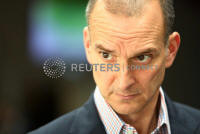Rodchenkov Anti-Doping Act a game-changer, says Tygart
 Send a link to a friend
Send a link to a friend
 [February 13, 2021]
By Steve Keating [February 13, 2021]
By Steve Keating
(Reuters) - After several doping
scandals the Rodchenkov Anti-Doping Act will offer hope that
broadcasters and sponsors will get a drug-free competition at the
Tokyo 2020 Olympic Games, United States Anti-Doping Agency (USADA)
chief Travis Tygart said on Friday.
Part of a Hudson Institute panel discussing how the Rodchenkov Act
can help clean up doping fraud in international sports, Tygart
praised the legislation signed into law on Dec. 4 by then U.S.
President Donald Trump as a "game-changer".
The Act was named after the whistleblower Grigory Rodchenkov, who
helped expose Russia’s state-sponsored doping programme. It extends
U.S. law enforcement jurisdiction to international sporting
competitions that involve American athletes or have financial
connections to the United States.
"I think it is going to be a game-changer both for athletes, for
fans and sponsors," said Tygart. "Hopefully sponsors will finally
get the return on their investments, the value, to what they are
paying for when it comes time to broadcast.

"NBC has paid several billion dollars to broadcast the Tokyo 2020
Games that will happen this summer into the United States and you go
back to 2016, 2014, 2012 what they paid for they didn't get."
Investigations by the World Anti-Doping Agency (WADA) have recovered
evidence of widespread Russian state-sponsored doping going back to
the 2012 Summer Olympics. Scores of positive doping tests years
after the London 2012 Games have resulted in many medals being
stripped, most of them from Russians athletes.
Russian track and field athletes were banned from the Rio 2016
Olympics for doping, while Russia's 2014 Sochi winter Games were
tarnished by the country's elaborate doping scheme to help their own
athletes win more medals.
The 2018 Pyeongchang Winter Olympics, held under the
Russian doping scandal cloud, were not included on Tygart's list of
tainted Games having unfolded without a major drugs controversy.
[to top of second column] |

The United States
Anti-Doping Agency (USDA) Chief Executive Officer, Travis Tygart,
attends an interview with Reuters during the World Anti-Doping
Agency (WADA) Symposium in Ecublens near Lausanne, Switzerland,
March 13, 2019. REUTERS/Denis Balibouse

Russia, which has in the past acknowledged some shortcomings in its
implementation of anti-doping policies, denies running a
state-sponsored doping programme.
Tygart, however, warned that any business, sport governing body or
country plotting ways to profit from doping fraud at future Olympics
or major events will not only have to contend with WADA but the U.S.
Department of Justice.
Pointing to the "FIFA model", Tygart explained that those engaging
in doping fraud can now expect the same harsh treatment dealt out to
soccer officials caught up in the money laundering and bribery
scandal that had dozens removed from office, fined or sent to prison
from 2015 onward.
The Rodchenkov Act has provided the Federal Bureau of Investigation
the hammer to nail those looking to profit from doping fraud.
"Organised crime will figure out any way they can to monetize
variables associated with sports," said Joseph Gillespie, Unit
Chief/Program Strategist, Transnational Threats for the FBI. "We in
the past have had to rely on some peripheral crimes to get to the
group to stop their activities.
"Right now with this act this just gives us that huge hammer."
(Reporting by Steve Keating in Toronto. Editing by Christian
Radnedge)
[© 2021 Thomson Reuters. All rights
reserved.] Copyright 2021 Reuters. All rights reserved. This material may not be published,
broadcast, rewritten or redistributed.
Thompson Reuters is solely responsible for this content.
 |